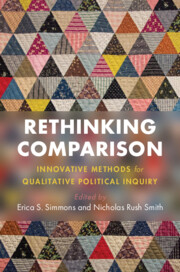Book contents
- Frontmatter
- Dedication
- Contents
- List of Figures
- List of Tables
- List of Contributors
- Acknowledgments
- 1 Rethinking Comparison: An Introduction
- Part I Rethinking the Building Blocks of Comparison
- Part II Developing New Approaches to Comparison through Research
- 7 Comparing Complex Cases Using Archival Research
- 8 Composing Comparisons: Studying Configurations of Relations in Social Network Research
- 9 Against Methodological Nationalism: Seeing Comparisons as Encompassing through the Arab Uprisings
- 10 Comparative Analysis for Theory Development
- 11 Problems and Possibilities of Comparison across Regime Types: Examples Involving China
- 12 Comparisons with an Ethnographic Sensibility: Studies of Protest and Vigilantism
- Theory and Imagination in Comparative Politics: An Interview with Lisa Wedeen
- Index
12 - Comparisons with an Ethnographic Sensibility: Studies of Protest and Vigilantism
from Part II - Developing New Approaches to Comparison through Research
Published online by Cambridge University Press: 24 September 2021
- Frontmatter
- Dedication
- Contents
- List of Figures
- List of Tables
- List of Contributors
- Acknowledgments
- 1 Rethinking Comparison: An Introduction
- Part I Rethinking the Building Blocks of Comparison
- Part II Developing New Approaches to Comparison through Research
- 7 Comparing Complex Cases Using Archival Research
- 8 Composing Comparisons: Studying Configurations of Relations in Social Network Research
- 9 Against Methodological Nationalism: Seeing Comparisons as Encompassing through the Arab Uprisings
- 10 Comparative Analysis for Theory Development
- 11 Problems and Possibilities of Comparison across Regime Types: Examples Involving China
- 12 Comparisons with an Ethnographic Sensibility: Studies of Protest and Vigilantism
- Theory and Imagination in Comparative Politics: An Interview with Lisa Wedeen
- Index
Summary
To what extent can an ethnographic sensibility enhance comparison? We argue that approaching comparison with an ethnographic sensibility – that is, being sensitive to how informants make sense of their worlds and incorporating meaning into our analyses – can strengthen comparative qualitative research. Adopting an ethnographic sensibility would enhance the quality of scholarly arguments by incorporating the processes through which actors ascribe meanings to their lived experiences and the political processes in which they are enmeshed. Because social science arguments often involve accounts of individual actors’ interests, ideas, or impressions, it is imperative to place such cognitive arguments in a broader cultural context. Adopting an ethnographic sensibility requires attention not only to that context but also to the political and social meanings which make that context intelligible. We elaborate these arguments through the lens of two comparative ethnographic works: a study of political mobilization in Bolivia and Mexico and a study of vigilantism in two South African townships.
Keywords
- Type
- Chapter
- Information
- Rethinking ComparisonInnovative Methods for Qualitative Political Inquiry, pp. 231 - 250Publisher: Cambridge University PressPrint publication year: 2021
- 3
- Cited by

